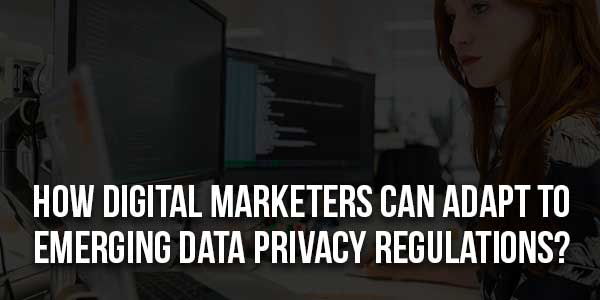
Data privacy has become an essential concern. With new regulations emerging worldwide, digital marketers must adapt swiftly. These, including GDPR, CCPA, and CPRA, impose strict requirements on data collection, storage, and use. As a result, marketers need to revise their strategies to ensure compliance. Understanding these changes and adapting accordingly is essential for maintaining consumer trust and avoiding legal issues.
Table of Contents
Understanding The New Data Privacy Regulations:
There are many intricate data privacy regulations that marketers must grasp. For instance, the General Data Protection Regulation (GDPR) in Europe and the California Consumer Privacy Act (CCPA) in the U.S. mandate strict data collection and user consent rules. GDPR requires businesses to obtain explicit consent before collecting personal data, while CCPA grants consumers the right to know what data is collected and to request its deletion.
Another key point is that these regulations are not static. They evolve, introducing new laws like the California Privacy Rights Act (CPRA). Hence, staying informed about these changes is vital for compliance and effective marketing.
Consent In Digital Marketing:
Obtaining explicit consent from users is a cornerstone of data privacy regulations. Consent must be clear, informed, and freely given. This means marketers need to design consent forms that are straightforward to understand. Not to mention, consent should be obtained before data collection occurs.
Similarly, it’s important to manage consent effectively. For example, implement systems that allow users to modify or withdraw their consent easily. This practice not only ensures compliance but also fosters trust with your audience.
Data Minimization: Collect Only What You Need:
Data minimization is another principle embedded in data privacy regulations. In short, this principle requires marketers to collect only the data necessary for their specific purposes. With this in mind, avoid collecting excessive or irrelevant information.
Another key point is that minimizing data collection can also enhance user trust. For instance, when users know their data is handled responsibly, they are more likely to engage positively with your brand. Implementing data minimization techniques can streamline your marketing processes and reduce the risk of non-compliance.
Data Protection Impact Assessments (DPIAs) Explained:
A Data Protection Impact Assessment (DPIA) is a tool to identify and mitigate risks associated with data processing activities. To begin with, DPIAs help ensure that data protection is integrated into your projects from the outset. In contrast to reactive measures, DPIAs are proactive, allowing you to address potential issues before they arise.
Conducting a DPIA involves mapping out your data processing activities, assessing their impact on privacy, and implementing necessary safeguards. Furthermore, DPIAs are required under regulations like GDPR for processing activities that pose a high risk to individuals’ rights.

Adapting Your Marketing Strategies To New Regulations:
Adapting marketing strategies to comply with new regulations requires innovation. Not to mention, it’s important to update existing tactics and explore new approaches. For example, incorporate privacy-friendly strategies such as anonymizing data or using aggregated data for analysis.
Similarly, adopting a privacy-by-design approach can help integrate compliance into your marketing processes seamlessly. In contrast, traditional methods that ignore privacy concerns may lead to costly adjustments later.
Implementing Secure Data Storage and Management Practices:
Ensuring secure data storage and management is important for compliance. You can use encryption to protect data both in transit and at rest. Additionally, security measures should be regularly updated to address emerging threats.
With this in mind, consider employing technologies and tools designed to enhance data protection. Data management platforms that offer robust security features can help safeguard sensitive information. Hence, secure data storage practices protect user data and build credibility for your brand.
Training Your Team On Data Privacy Compliance:
Effective compliance also involves training your team. All employees should be aware of data privacy regulations and their role in maintaining compliance. Another key point is that training should cover essential topics such as data protection principles, consent management, and handling data breaches.
Therefore, interactive training programs should be developed and updated regularly to reflect the latest regulations. Consider using real-life scenarios to help your team understand the practical implications of data privacy.
Embracing Privacy-First Marketing Techniques:
Privacy-first marketing focuses on designing strategies that prioritize user privacy from the start. As an illustration, this can involve using privacy-preserving technologies such as cookieless tracking solutions or first-party data strategies. Adopting these techniques not only helps in compliance but can also enhance customer loyalty. Customers who feel their privacy is respected are more likely to engage with and support a brand. Similarly, transparency about how data is collected and used can strengthen your brand’s reputation. With this in mind, investing in privacy-first marketing techniques is not just a regulatory requirement but a strategic advantage in today’s data-driven world.
Leveraging Technology For Data Privacy Compliance:
Data management platforms (DMPs) equipped with built-in privacy features can streamline the process of data collection and management while ensuring compliance. Automated tools can assist in monitoring and reporting data breaches or privacy incidents, allowing for quicker responses and mitigations. So, integrating technology solutions tailored to data privacy can significantly reduce the manual effort required for compliance and minimize the risk of human error. Furthermore, AI-driven analytics can provide insights into data usage patterns, helping you make informed decisions while adhering to privacy regulations. In short, leveraging advanced technology can enhance compliance and operational efficiency in data privacy.
Staying Ahead In The Era Of Data Privacy Regulations:
Adapting to emerging data privacy regulations is critical for digital marketers. Staying informed about regulatory changes and implementing best practices will ensure compliance and protect user trust. In contrast to businesses that lag in adapting, those that proactively address privacy concerns are likely to build stronger relationships with their audience.

 About the Author:
About the Author:
















Be the first to write a comment.